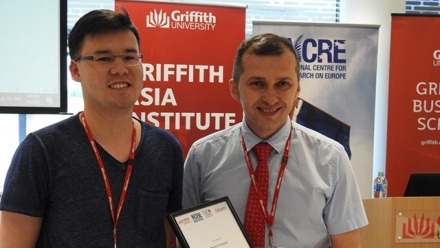Berikbol Dukeyev receives conference award

CAIS research scholar Berikbol Dukeyev received the Best Paper Award at the Australasian Association for Communist and Post-Communist Studies, 14th Biennial Conference on 1 February 2019.
Australasian Association for Communist and Post-Communist Studies (AACaPS) was set up in 1990 by the late Professor T H Rigby, an internationally-renowned Sovietologist and long-serving member of the ANU academic staff. The Association has been led by a number of distinguished scholars, such as Leslie Holmes, Graeme Gill and Kirill Nourzhanov. It is currently led by Alexandr Akimov from Department of Accounting, Finance and Economics at Griffith University.
2011 AACaPS-X was launched by Hon. Bob Hawke and marked resurgence in interdisciplinary scholarly interest in communist and post-communist societies. The growing importance of China, more active role of Putin administration in global affairs and growing instability around North Korea spurred the interest further.
Berikbol received the award for his paper entitled: 'The Soviet past in post-1991 nation-building of Kazakhstan'. The paper was selected from a large field of prestigious work. All at CAIS offer Berik our warmest congratulations.
Paper abstract
This paper examines how the process of historical revisionism of the Soviet past in Kazakhstan’s official historiography is utilized in the country’s post-independence nation-building. The focus of the research will be on the ways that the Soviet period and its legacy have been produced, portrayed, evaluated, and analysed in state-led and nationalist narratives. This article argues that history writing of the Soviet past in Kazakhstan is a site of contention between competing political groups and elites inside the governing regime, which leads to patchy and sometimes contradictory production of narratives about the Soviet past. Despite the authoritarian nature of Kazakhstan’s political regime, competing interest groups influence to a considerable extent the interpretation of the Soviet past for the purposes of gestating a ‘national idea’. The President merely suggests broad approaches to shaping collective memory which leaves a great deal of leeway and autonomy in how the authors of history textbooks deal with specific events during the Soviet period and which trends they highlight or relegate to oblivion. In this context, this thesis will attempt to challenge previous literature, which has argued that the state is a monolithic, hegemonic and homogeneous institution exercising full and constant control over the entire process of nation-building.









